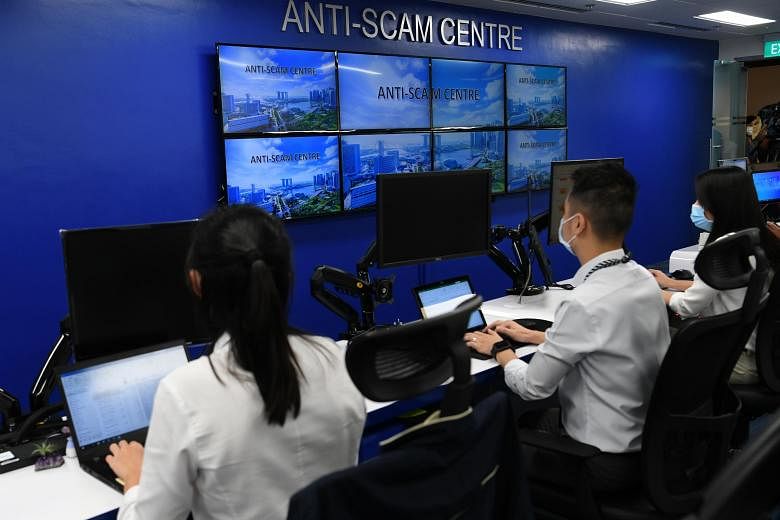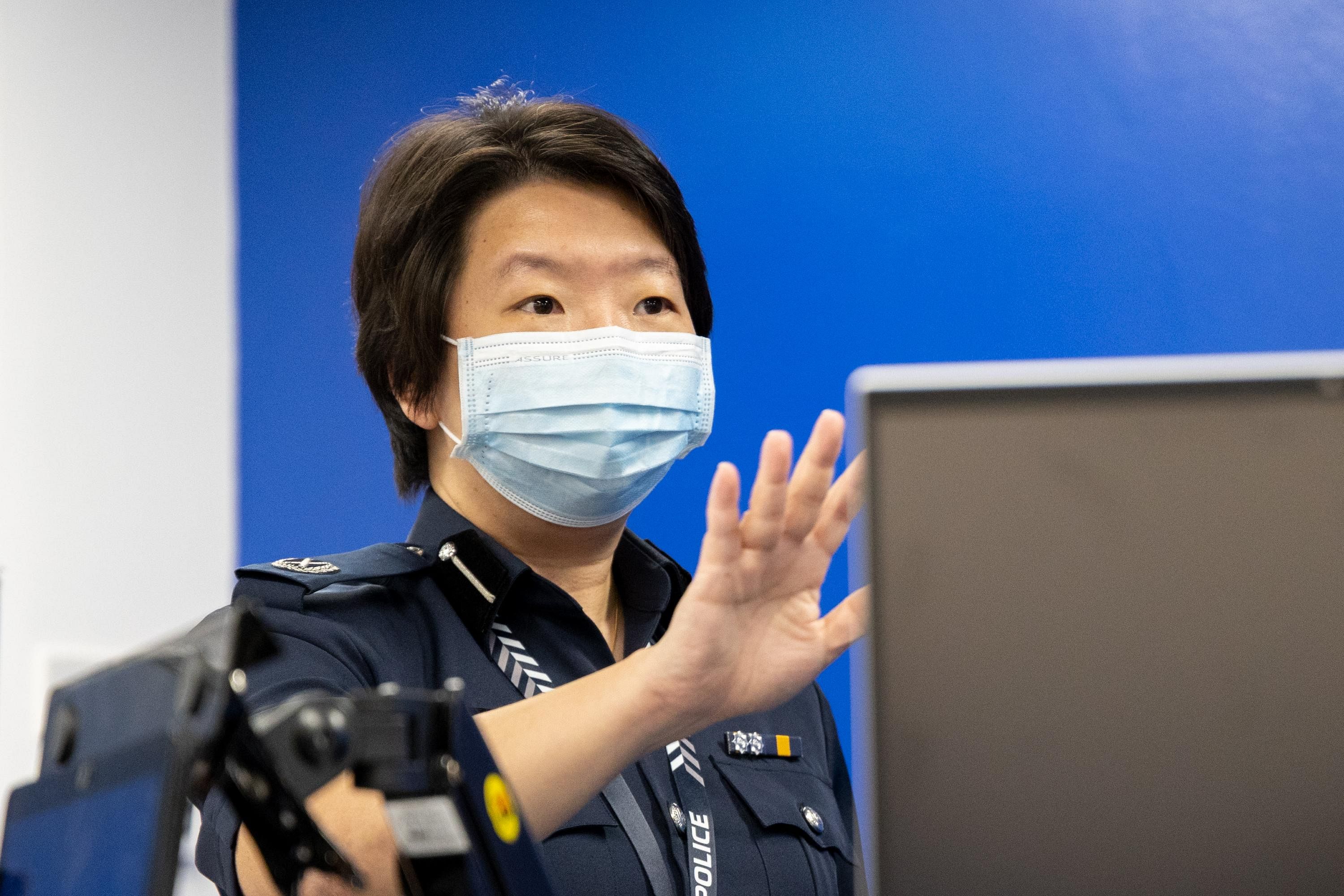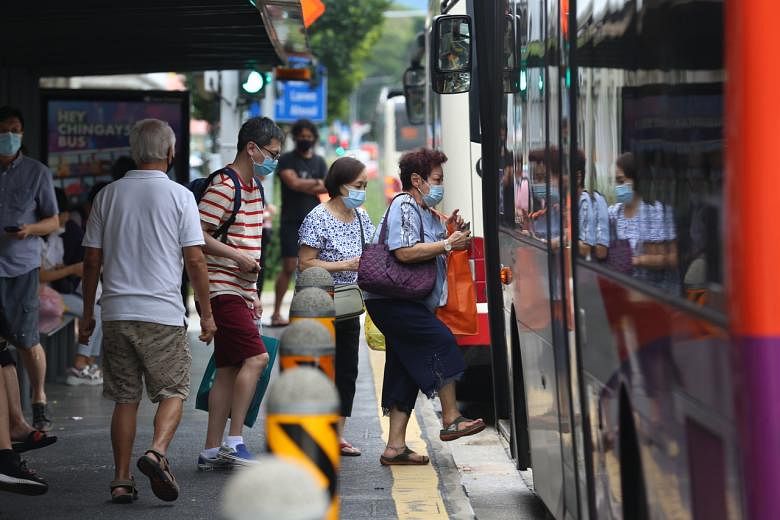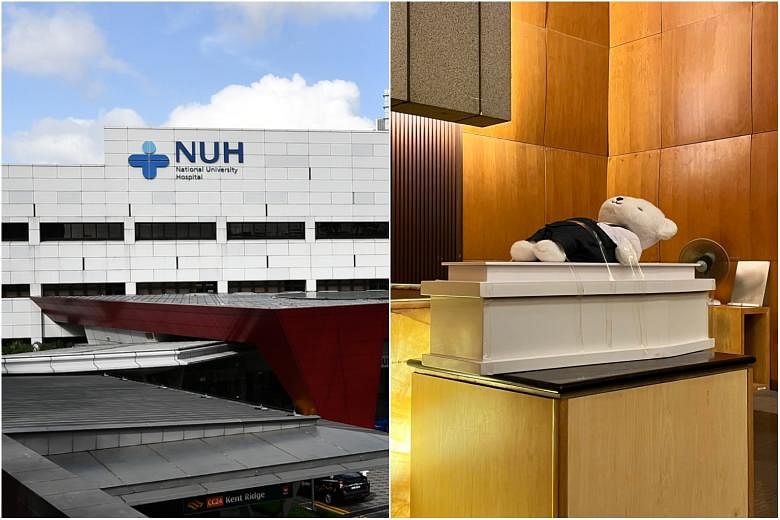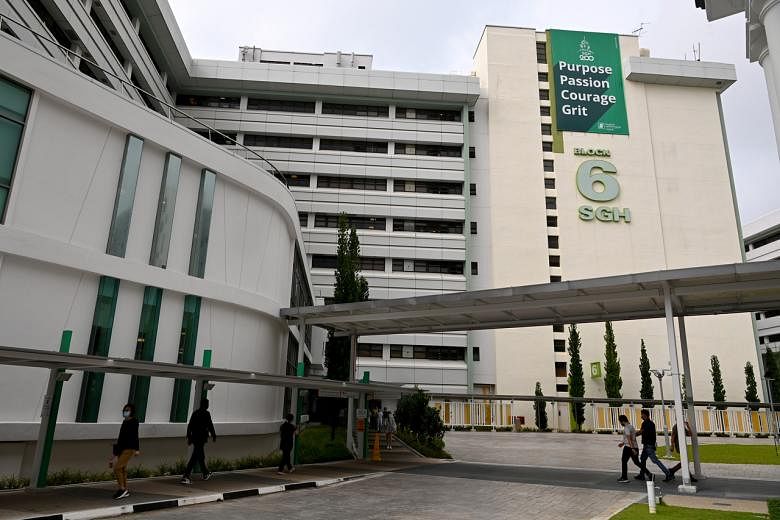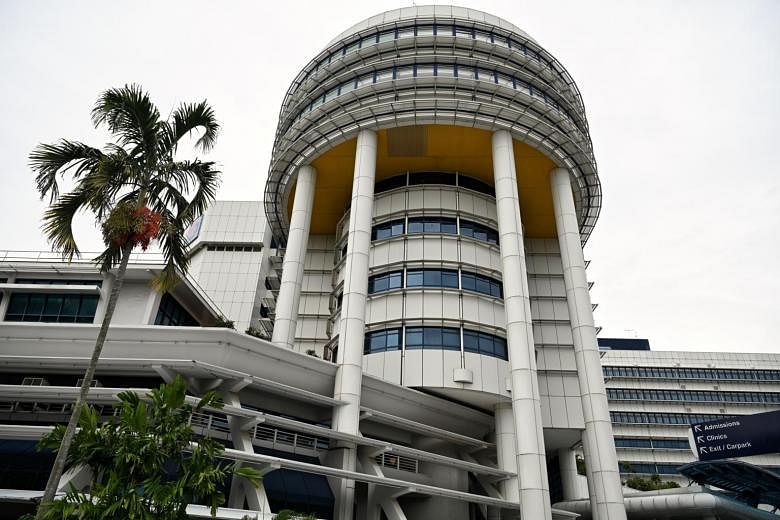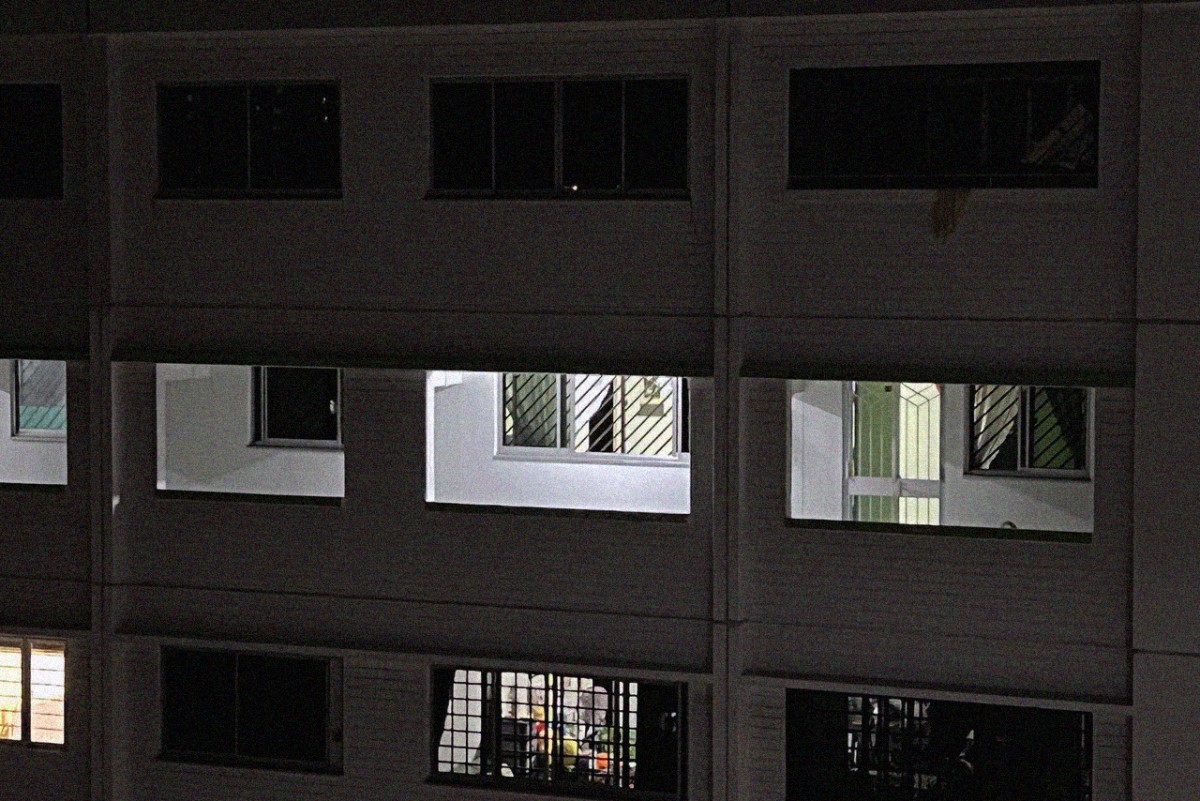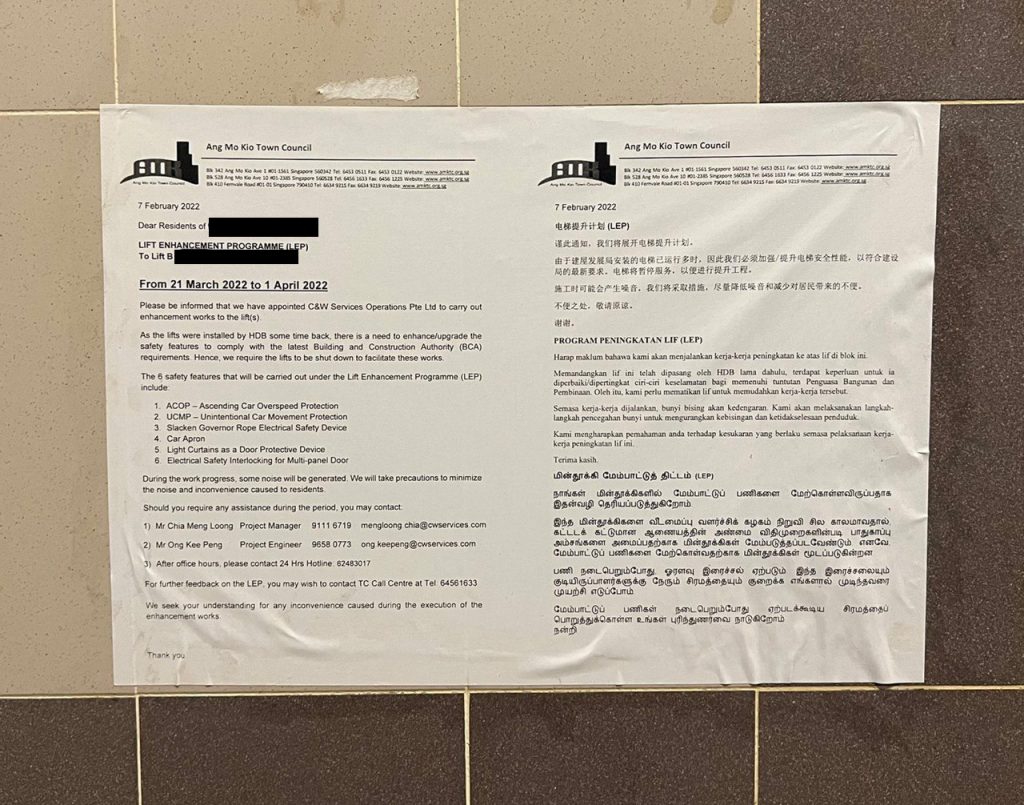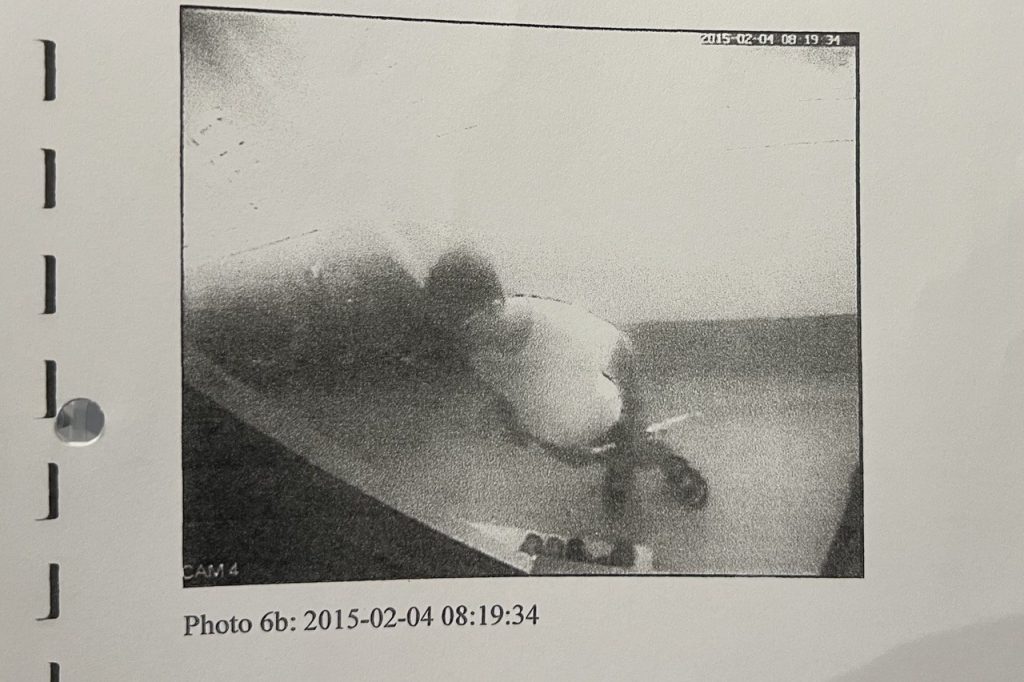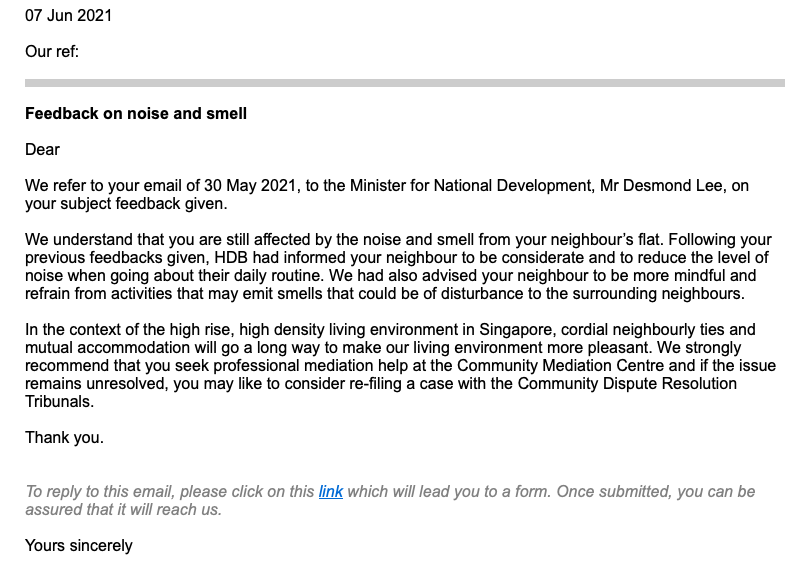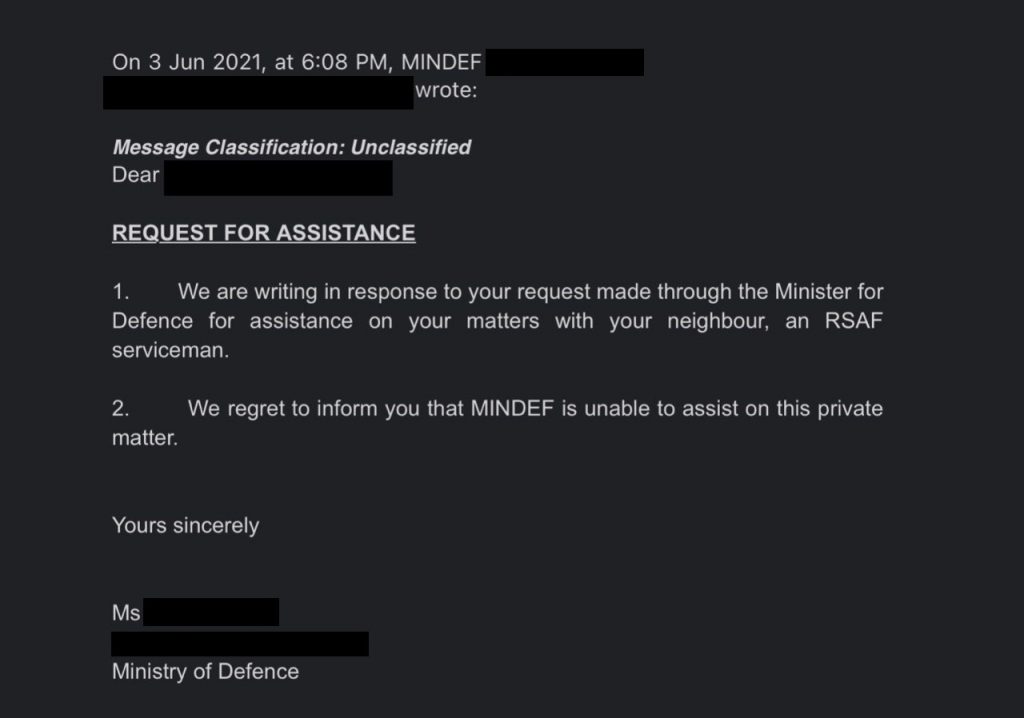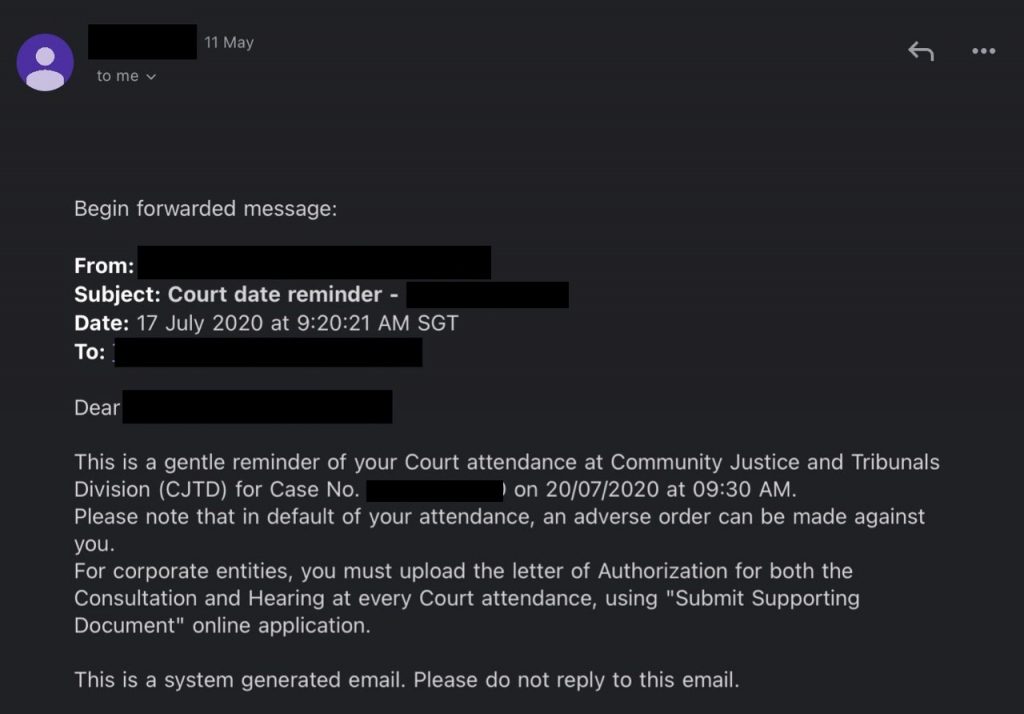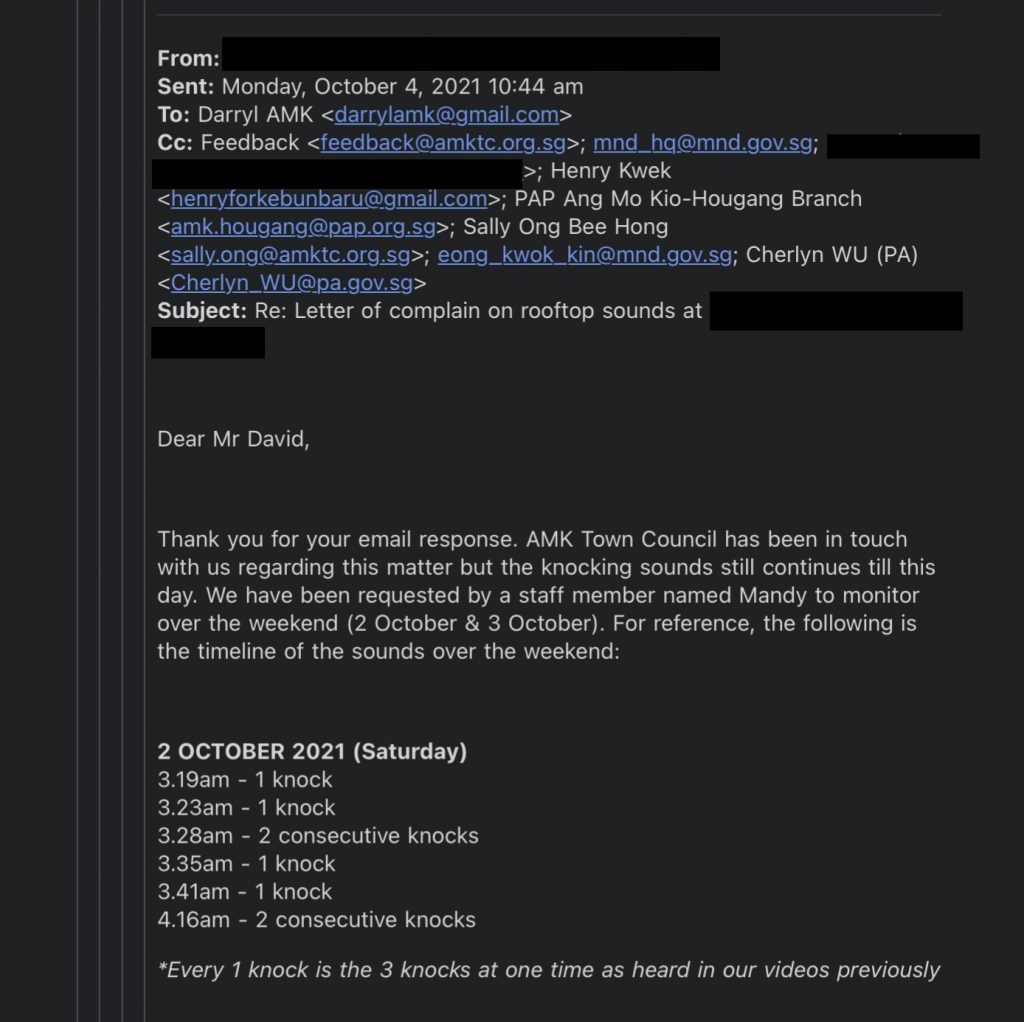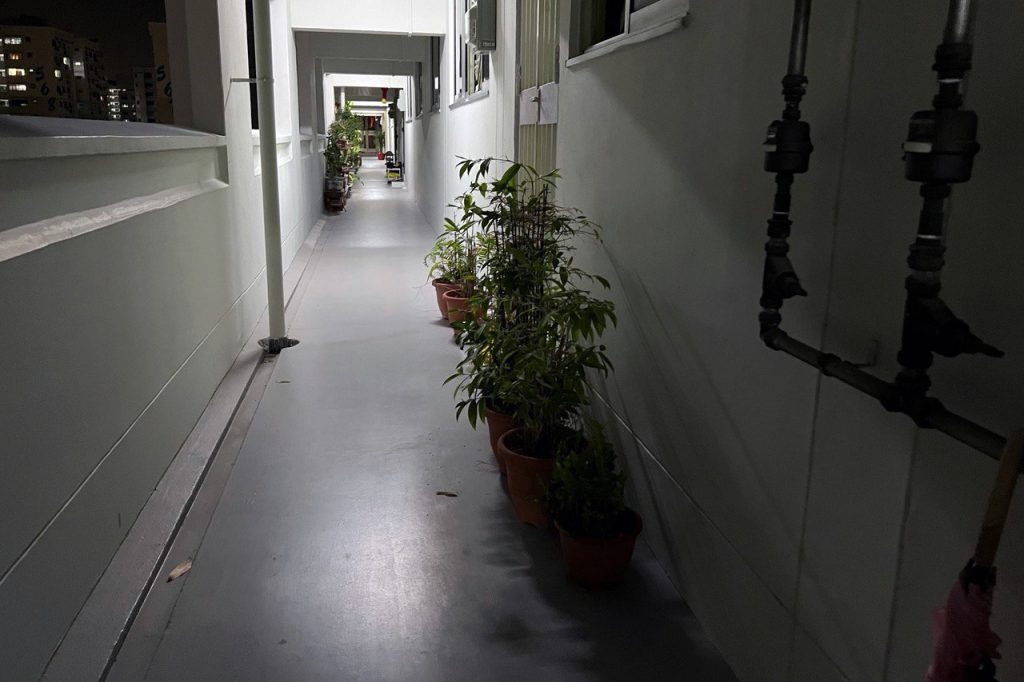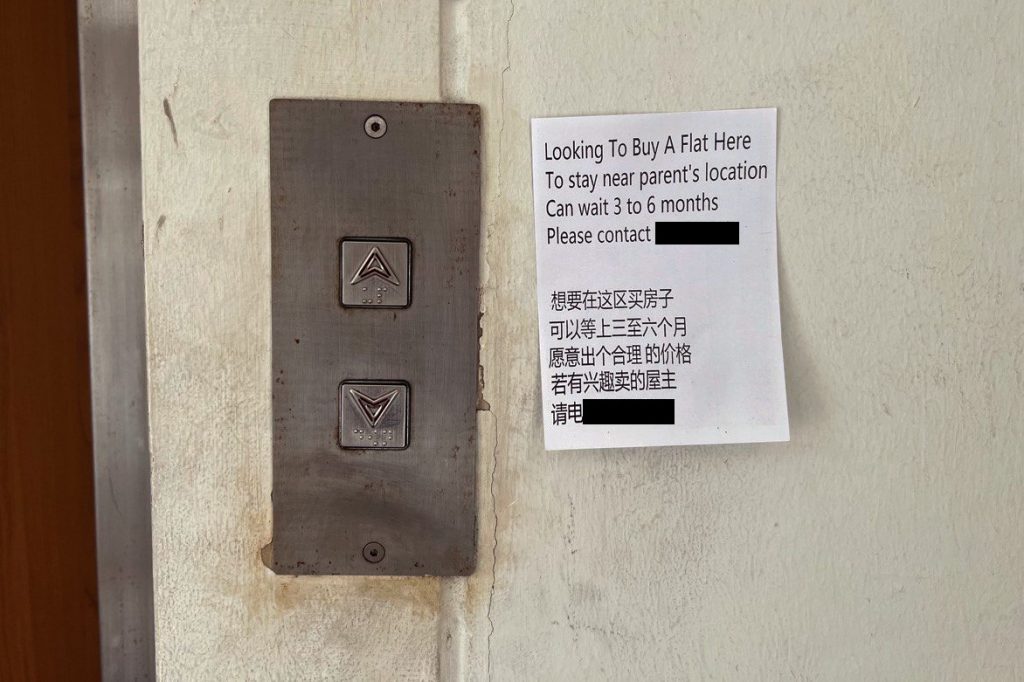11 Years of Noise Terror: How One Man Holds a Hougang Block Hostage
by
Zat Astha
May 23, 2022
Top image: Zat/Rice Media
All names have been changed
Faye recalls the Wednesday afternoon on 6 February 2013 when she was spat on by Shi-jie’s mother as she was walking past the unit to get home. “It was the first time I was spat on during this long dispute. Previously, apart from the noise Shi-jie inflicts, his mother would just stand by the door and hurl vulgarities at me.” Faye was 19 years old then.
Still, that would not be the only time when Shi-jie’s mother would assault Faye in this fashion. It would happen again three years later, almost to the date of the first incident, on 17 February 2016 at 10 p.m. Faye was on the way back to her university dorm when Shi-jie’s mother spat at her while she was waiting for the lift, rounding up the assault with a string of colourful expletives.
“I didn’t make a police report this time around because I was too shocked by what had happened and, having just come back from a university exchange, was in a rush to go back to school,” she wrote in a 27-page document compiled in 2016 on her mother’s behalf to the Community Disputes Resolution Tribunals (CDRT).
The evidentiary tome was submitted in support of a claim filed by Faye against her neighbour, 41-year-old Shi-jie, and his mother, who has been inflicting noise nuisance, verbal assaults, and outright harassment on Faye and her family since 2011.
It’s a story that spans over a decade from when Faye was a teenager taking her ‘O’ level exams through to her undergraduate studies at NUS, and now as a working adult at 28 years old.
The banging happens throughout the night and echoes around the estate (Video: Claire)
A predetermined, predictable schedule of banging
The intense banging Shi-jie inflicts on the block occurs every night, set to a predetermined, almost predictable schedule that lasts until the wee hours of the morning. Only when he’s away at work as an employee of the Republic of Singapore Air Force or out running errands would the neighbourhood enjoy some peace.
The brief respite lasts until 6 p.m., when he would come home, announcing his return with raucous and sporadic bursts of banging from within his 4-room Housing Development Board (HDB) flat. Faye is most affected by this because she and Shi-jie share the common wall from where the banging sounds are made.
The hammering would last throughout the evening, echoing within the estate, made up of long blocks of flats arranged in parallels, creating a natural acoustic chamber that further amplified his antics.
The banging from the corridor outside the house
Then, just as suddenly as it began, at 10 p.m. (on most days), an unnerving silence descends upon the residents of this estate as Shi-jie, a 5th Dan Aikido Sensei with
Aikido Shinju-Kai Singapore, makes his way out on his white motorbike, chugging along major roads and expressways at a snail’s pace of 40km/h—sometimes slower.
When we followed him on this nightly outing to better understand the behaviour of a perennial troublemaker, we found that he would ride to Bedok and park on the pavement outside Block 529, Bedok North Street 3.
Here, he would whip out his Nintendo Switch and play games on it as he stood leaning against his motorbike, spending the entire three hours plugged into the console before riding back home. Shi-jie would reach at 1 a.m., and the banging would start all over again, sporadically but methodically throughout the night.
There’s a pattern to his banging—ten rapid successions of thuds, ending with one definitive hit that brings the etude to a close—that seldom deviates.
On weekends, the banging knows no concept of time, as Shi-jie bangs throughout the day, pausing at 7 p.m. when he would make his way out of the home. He would then come back, as always, at 1 a.m., and the banging resumes.
Rinse and repeat. Everyday.
“I’ve been hearing this for five years already.”
Mr E
The 8th floor neighbour
Curious to hear the intensity of the hammering on the weekend, I decided to visit the block one Sunday noon after being alerted by Faye that Shi-jie was home and up to his usual raucous. He had been at it since 10 a.m. she adds.
I was a few metres from the block, nearer to the multi-storey carpark, when, clear as day, I heard the unmistakable
bang-bang-bang-bang-bang-bang-bang-bang-bang-bang-BANG echo around the estate. I hurriedly took the
lift up to Faye’s floor to observe the goings-on inside the flat when this hammering sound was made, only to be greeted by scores of neighbours from other levels who had to take this lift due to the common lift being down for servicing.
As this was a shared corridor floor, residents had to take the lift to this floor before taking the stairs down to their respective units.
The lift repair notice (Image: Rice Media)
At the floor of Shi-jie’s and Faye’s units, I saw neighbour after neighbour gesturing and pointing Shi-jie’s flat out to me every time the hammering started. As if to say, “This is the unit you’re looking for. It’s this one.”
Then, I saw Mr E from the 8th floor, a resident of the block for five years, dressed in blue T-shirt and shorts, appear at the end of the corridor, his ears craning to know where the noise was coming from.
I gestured to Shi-jie’s unit, which then saw us taking up station outside the flat’s bedroom, its windows half drawn, the thick and suffocating smell of chlorine wafting past our N95 masks. I’ll explain the chlorine smell later.
“I’ve been hearing this for five years already,” Mr E shared. “Every night, I hear it, and I’ve endured it throughout. But this is the first time I decided to come up.”
Through a stroke of luck, there was a delivery for the unit on that day which meant Shi-jie’s mother had to open the door to receive the parcel. That’s when Mr E took the opportunity to ask Shi-jie’s mother some pointed questions in Chinese right at her doorstep.
Mr E confronting Shi-jie’s mother about the noise
“Can you don’t make so much noise, ah?” Mr E asked, his rage rising.
“It’s not me,” Shi-jie’s mother replied, defiant.
“Everyone here says it’s you,” Mr E went on. Shi-jie’s mum ignores his allegation.
“What noise are you making? If you’re not making noise, then why I can hear the noise from your unit? I’ve been hearing for so many years, five years. I’ve had it. I know it’s coming from your unit. What the hell are you doing inside?”
Unfazed, Shi-jie’s mom retreated and closed the door, leaving Mr E with none of his questions answered. It’s not uncommon for Shi-jie to deploy his mother to fend off annoyed neighbours. Perhaps he thinks no one would talk down to an old lady.
Unsurprisingly, almost immediately after the door closes, the hammering resumes.
Until today, and even after many nights of observation of the unit at different times of the day, I still cannot ascertain what Shi-Jie is doing behind the walls.
Perhaps a clue can be gleaned from a pink-coloured plastic stool Shi-jie places at the wall where the noise is made, though there’s no concrete proof that that is what he’s persistently hitting.
The death of a patriarch
I first learned of Faye’s predicament through her
TikTok account, where she keeps keen video documentation of the banging that occurs throughout the day.
Still, to catch Shi-jie in the act was difficult, especially since there’s no absolute certainty as to when the banging would occur, predictable as his schedule came across.
Strangely enough, during my first in-person interview at Faye’s house, when she showed me a trove of documentation to support her claims of police reports made and mediation sessions attended, Shi-jie deviated from his usual schedule, which meant I couldn’t hear for myself the kind of sound assault Faye faces daily. “I think today he is on off; that’s why he left the house earlier than usual,” Faye explains.
Faye has been living in this 4-room flat with her hawker parents and older brother for 16 years, having moved from an estate nearby, mere minutes away from where they currently live.
At the start, Faye and Shi-jie’s family enjoyed an amicable relationship, often greeting each other if their paths crossed at the common areas. But all that changed a few years before Shi-jie’s father passed on in 2012.
“His father was a very nice and considerate man. He always apologises on their (Shi-jie and his mom) behalf,” Faye recalls. “We will often see him sitting downstairs in the evenings. When we ask why he’s not at home, he would say his wife and son are very sensitive to noise, so he would come down to the void deck and while the night away, reading the newspaper until it was time to go back home and sleep.”
“The father also shared that Shi-jie and his mom both had mental health issues, though we can’t know if it’s true,” Faye added.
Privacy, breached
Things took a turn for the worst in 2010 when Faye was in the thick of ‘O’ level preparations. Shi-jie appeared at her doorstep one afternoon and accused Faye of playing with marbles, stomping her floor, hammering objects, and playing with the doorbell. She categorically denies this.
“In the time we lived here, we’ve never owned a doorbell. My mum thinks it’s noisy. So we’re not sure what he’s talking about. We suspect the sound came from the door chime at the 7-11 store nearby, but we can’t be sure what he heard.”
Shi-jie would also often linger outside Faye’s flat and look in. As their flat shares a common corridor with eight other units, it was something Faye and her family couldn’t control, save for installing a CCTV camera to hopefully deter Shi-jie from further invading their privacy.
Shi-jie looking in to Faye’s room (Image: Faye)
Shi-jie loitering outside Faye’s room shirtless (Image: Faye)
Once, on 5 March 2015, Shi-jie was caught on camera approaching the home while shirtless and without wearing shoes to reprimand Faye. Three years prior, in 2012, the CCTV also captured Shi-jie loitering outside Faye’s room, acting suspiciously.
To counter this, Faye has put up quarter-height PVC boards flushed against her room window to block any prying eyes from looking in. This proved to be especially useful during Circuit Breaker in 2020, when she worked from home and was at the mercy of Shi-jie’s harassment at all hours of the day.
A Circuit Breaker breaking point
“During the Circuit Breaker, the banging became an everyday occurrence. Before, it was just one-off hammerings, but now, it’s getting more frequent,” Faye recalls. “It’s also getting much louder. A follower of my TikTok account who lives at the opposite block managed to record the noise he’s making. That’s how loud and how brazen he’s being now.”
The allegations Shi-jie made towards Faye increased several folds too during Circuit Breaker.
“When neighbours confront him, he would tell them that my family was the one making all the ruckus, that I like to kick the shared wall and that there’s water seeping through the walls on his side—an impossibility since such a phenomenon would affect my side of the wall too.”
“Even then, Shi-jie never asked HDB to come down and check to see if it’s true. But when I found out he was making such allegations to the other neighbours, I took the initiative to ask HDB officials to come down and check to see if what he says is true. Of course, when they checked his unit to ascertain what he said, they couldn’t find anything.”
Shi-jie would also complain of toxic odours and a burning smell coming from Faye’s room. Firefighters from the Singapore Civil Defence Force had been summoned before to investigate, reacting to Shi-jie’s complaint, but they couldn’t find anything, proving, once again, his allegations baseless and without due merit.
We’ve reached out to HDB to ask, amongst other things, what HDB can do by law to compel the occupant to stop such noise nuisances and, as landlords of public housing, what is HDB’s responsibility in ensuring residents deserve to live in a home with peace and quiet?
The ministry did not reply to our queries.
A thick, suffocating odour of chlorine
Still, if there were a smell being emitted, it would be the thick blanket of chlorine that wafts through the air, coming from the room in Shi-jie’s house that is directly beside Faye’s.
The odour is strong enough to be picked up by a person wearing a mask from about 50 meters away.
During my visits, the smell would linger along the corridor if Shi-jie was home and can only be described as intensely suffocating. The odour is further exacerbated with the use of a small desktop fan angled to face Faye’s room that serves only one purpose: to diffuse the smell in the direction of her premises.
It’s an intentional act of harassment that Faye tells me HDB officials who visited her home to ascertain her concerns have acknowledged.
One of the many emails where Faye was told to live and let live. (Image: Faye)
“Once, an HDB official sat down in my room for around half an hour, heard the banging and told me, “I don’t think there’s much annoyance caused to you”. I was fuming! I said the banging happens mostly at night. All he could say was, “Well, I can’t be here at night.”
Faye then asked him if he could smell the chlorine. He replied that he couldn’t really ‘smell well’ and asked a colleague to check if what she said was true. “The colleague eventually confirmed what I said but told me to ask the National Environment Agency (NEA) for assistance instead,” Faye shares.
“I did go to NEA, but they said there’s nothing they can do if the smell comes from inside the house. They only deal with matters happening outside the home.”
“I’ve also emailed MINDEF (Ministry of Defence) for help since I’ve seen him leaving the house while wearing the blue uniform, asking them to step in and take Shi-jie to task. But their reply to me was that they don’t get involved with private matters,” Faye explains.
The reply after Faye sent an email to Ng Eng Han for assistance (Image: Faye)
The Community Mediation Centre sessions
As with most neighbourly disputes, the first, most approachable and immediate cause of action would be to attend a mediation session at the Community Mediation Centre (CMC). The CMC is an agency with the Ministry of Law created under section 3 of the Community Mediation Centres act with the aim of providing an informal, friendly, and efficient way to settle inter-personal social and community disputes between people.
The outcome of the first mediation session in 2012 was that Faye’s mum would agree to withdraw the complaint made against Shi-jie and decide to ‘let bygones be bygones and be good neighbours’. Still, that did little to coerce Shi-jie to stop the assault against Faye and her family. Vulgarities kept being lobbied to the family, and the verbal abuse towards Faye did not abate.
A second mediation session three years later, in April 2015, was arranged after Faye’s mum decided to file a magistrate complaint against Shi-jie. This time, an email sent to the Prime Minister’s Office requesting assistance prompted CMC to extend the invitation to mediate.
Again, a settlement agreement from that mediation was drawn up and accepted. This time around, the terms were that both parties agree not to interfere in each other’s affairs, not walk past each other’s unit unless absolutely necessary, and exercise care to ensure that there is no consistent excessive noise from their units that may disturb each other. Shi-jie would also advise his mother not to hurl any strong language against Faye or her family.
Similarly, as before, the settlement agreement had no effect on Shi-jie and his mother, who, mere weeks later, continued their daily barrage of verbal insults, expletives, and banging throughout the night.
The CDRT trial that wasn’t
“At the pre-trial conference at the Community Disputes Resolution Tribunals (CDRT), the presiding judge said there was no point for me to proceed to the official CDRT hearing because I will definitely lose due to insufficient evidence,” Faye shares, frustration mounting in her voice.
Faye decided to go the CDRT route in July 2020 on the advice of HDB and the Singapore Police Force (SPF), hoping this final legal move would put an end to her suffering.
Image: Faye
According to the Singapore Courts website, the
Community Disputes Resolution Tribunals (CDRT) hear disputes under the
Community Disputes Resolution Act (CDRA) between neighbours involving acts of unreasonable interference with the enjoyment or use of places of residence. The pre-trial conference allows the parties to resolve their dispute amicably before bringing the case officially to trial.
If found guilty, the judge may grant, amongst other things, an order of injunction, damages or apology. Suppose the respondent fails to comply with the order. In that case, they may be subject to a fine not exceeding S$5,000 or to imprisonment for a term not exceeding three months or both. In the case of a continuing offence, the respondent will be imposed a further fine not exceeding S$1,000 for every day or part of a day during which the violation continues after conviction but not exceeding S$10,000 in total.
This was where Faye found herself stuck in a legal conundrum with no possible way forward. At the pre-trial conference, the judge told her that even if there is a legal exclusion order enforced, Shi-jie can still breach it, thus further dragging this issue out. The pre-trial, he says, was the best way to end things amicably.
“So I withdrew,” Faye explains, “because I know there is no progress from the pre-trial conference. The judge is also unwilling to move me to the next stage and insists that I will lose with the current evidence. When I asked him what evidence I needed, he refused to tell me citing the need for him to remain impartial.”
“I felt very disgusted when I saw Shi-Jie at the pre-trial conference at the CDRT,” Faye recalls, her face scrunched up in annoyance. “He looks like a normal person. I remember the judge saying he looks like a nice person, and I look like a nice person too.”
During the pre-trial conference, the judge asked Shi-jie what he was hitting—what was all the noise he was making. “He said sometimes there are caterpillars in the house, so he hits them. Other times he alleges that needs to shift his furniture, which is obviously a lie.”
The banging on a weekend afternoon; 0:02 and 1:16 (Video: Claire)
The 22 police reports
To date, Faye and her mother have filed 22 police reports against Shi-jie and his mother. The earliest documented was in 2011, with the latest one being filed in 2021. Many others exist, though these were not kept or adequately documented.
The police reports are crucial in the grander scheme of things as they put in clearer perspective the type of harassment Faye and her family faced for over a decade.
When asked for comments on the problems Faye is facing, a spokesperson from the Singapore Police Force declined to comment on account that “Police investigations are confidential in nature”.
Of note is a report filed on 11 June 2016 at Hougang Neighbourhood Police Post. Filed by Faye’s mother, the report stated that while she was watering her plants along her corridor, Shi-jie ‘walked behind me and purposely bumped onto my butt area’, causing her to fall forward. The report went on to say that ‘I (she) shouted at him for his behaviour, but he ignored me and left’.
“I can say that there is zero support from the government, our MP, and the grassroots leaders. It’s such a disgrace especially since I thought I’m in a reputable Town Council.”
Joel
Amongst the 22 police reports, almost half were reports made due to verbal assaults lobbied against Faye and her family. Incidents of expletives hurled and insults in Hokkien lobbied were commonplace and, in many ways, were the least of the issues. However, one can imagine the type of toll that could take if exchanged almost daily.
An instance of the type of insults the family received was laid out in another report filed on 4 July 2014. It was 10.30 a.m. and Faye had just reached home when Shi-jie’s mother shouted across the corridor, calling Faye a ‘bastard and crazy dog’ in Teochew.
Other more micro passive-aggressive gestures, many caught on CCTV, include pulling the leaves of their potted plants in broad daylight, stealing a pair of slippers, and observing the family members from behind a wall at the void deck.
They may seem inconsequential, but, as with most micro-aggressions, it gnaws at you slowly but surely until you don’t even realise the wound is inflicted.
The neighbour upstairs: Claire and Joel’s story
Upstairs, newlyweds Claire and Joel greet a colleague and me warmly and offer us a glass of water. I noticed a framed picture of two bulls on the floor upon entering. It looks completely out of place in Claire’s and Joel’s home—spartanly furnished, walls knocked down to facilitate an open floor plan, and whatever little home decorations they have, kept to a minimum.
“It’s on the advice of a Feng Shui master we consulted,” Joel explained when I asked about the bulls. “He said that the pictures will keep the noise from Shi-jie downstairs to a minimum.” Did it work, I asked. “I mean, the sound is softer now,” Joel shares as Claire nods fervently in agreement. “So, I guess, yes?”
Claire and Joel started living together in this newly purchased house in September of last year. Joel moved in first in August and was joined by Claire a month later after tying the knot.
Still, it was only in the middle of the month, on 13 September, that the couple started hearing a loud and persistent banging occurring throughout the night. In an email they shared with me addressed to their Member of Parliament (MP), Mr Darryl David, the couple “tolerated the noise for a week as we assumed it was a one-off situation.”
A week later, and realising that the knocking sound was not abating, Claire and Joel started to keep timesheet records of when the knocking noises began and when they stopped. They also sent over several video clips filmed from within their master bedroom of the sounds they heard.
The banging Claire captured from her room at 2.53am. The banging can be heard at 0:07, 0:12, and 1:25. (Video: Claire)
“We were convinced that the noise was coming from the rooftop,” Joel says. “So we kept asking the Town Council and EMSU to send engineers down to check if the noise was due to the recent installation of solar panels. A representative even stayed in the master bedroom to observe the sound.”
After the representative acknowledged that there were knocking sounds heard from the master bedroom and the adjoining room, they sent engineers up to the rooftop again to check the lift and the water tank, but to no avail—they simply cannot verify what the noise was.
It was only after a Town Council staff spoke to residents on the 10th, 11th, and 12th floor of the block that they suspected the noise was coming from one of the units on the 11th floor.
The shared corridor of Shi-jie’s and Faye’s unit. (Image: Rice Media)
The confrontation
It all culminated one fateful night on 30 November 2021 at 2.53 a.m. Unable to tolerate the noise nuisance anymore, Joel and a fellow resident, Alice, from the opposite block decided to go down to the unit to confront Shi-jie about the knocking noise bothering them at all times of the day and night.
“When I approached the unit, Shi-jie’s mother was at the door while Shi-jie lingered at the back. I asked both of them why they were making so much noise, but both denied doing anything.”
Shi-jie’s mother went on to tell Joel that he had no right to be here in front of their house, and neither did he have the authority to record the exchange on his mobile phone.
Worried that the tense situation would escalate, Joel brought Alice down to the void deck to discuss the issue only to be joined by Shi-jie mere minutes later.
“Shi-jie said we don’t have any evidence that he was the one making all that noise and not to talk nonsense,” Joel recounts. “I told him that we don’t need evidence and that we know it’s him. He simply brushed us aside and walked away.”
Baby plans on pause
As newlyweds, Claire and Joel are planning to have a baby, but given the current situation they’re in, they’re now seriously reconsidering that decision. “The MOP (minimum occupation period), as you know, is five years. So if we have a baby next year, then will my baby have to tolerate this noise for four years? That’s not very fair right?” Joel explains.
Claire and Joel also shared how disappointed they feel towards the Ang Mo Kio grassroots community of the estate. “I can say that there is zero support from the government, our MP, and the grassroots leaders. It’s such a disgrace especially since I thought I’m in a reputable Town Council,” Joel elaborates.
One of the MPs for Ang Mo Kio town council is Singapore’s Prime Minister, Lee Hsien Loong.
He continues, “I previously stayed in an estate run by Worker’s Party and they were incredibly responsive when it came to residents’ feedback. Within two working days they would contact us, tell us what they intend to do, and assist us the best they can throughout the whole situation. We feel heard, you know?”
“And here?” I asked. “Here, the grassroots are not supportive. At all. I don’t see them visiting the unit, visiting us to update on the next steps, or sending the residents here reminders against excessive noise. Nothing.”
RICE has reached out to Mr David and Ang Mo Kio town council for comments but they have not replied our email as of the time this article is published.
A potential buyer looking to buy a unit at the block (Image: Rice Media)
“My life is just one huge joke.”
Something about Faye and her mom perplexes me during our interviews through Zoom, Telegram, and in-person interviews.
“How are you so positive about this whole issue?” I asked. “There’s nothing I can do, right? Faye replies in her typical jovial manner. “So might as well just be happy. After a while, I feel like my life is one huge joke.”
“It helps that I’m quite a deep sleeper although when it gets too unbearable, I will still stir in the middle of the night,” Faye admits when I ask how she can sleep through the night with the constant banging permeating through the wall. The intensity of the sound is such that it can be heard very clearly even from the multi-purpose hall at ground level, a good 90 metres away.
“I can’t even sleep in on weekends because he will be at home.”
Moving out isn’t an option for the family for now. Given the financial constraints, if they were to move, the preferred option would be to purchase a government-subsidised Build-to-order (BTO) flat. It’s a cheaper option, given the age of Faye’s parents, which means they cannot take up the maximum loan usually accorded to younger applicants.
However, since this would be the second time the family applied for a BTO unit, they would have to pay a hefty resale levy of S$107,300 (as of July 2015, when the appeal letter of waiver to HDB was sent). This amount must be paid in full and upfront before the keys can be collected.
The good news was that HDB was willing to ‘explore the possibility of allowing them to pay a lower resale levy of about S$57,900 in one cash lump sum instead’. However, this was subject to special approval because it was a significant deviation from HDB’s usual policy.
HDB’s reply to Faye’s request for levy waiver in 2015 (Image: Faye)
The reduced resale levy, while appreciated, was of little concession to Faye and her family, especially since moving homes would also mean spending more money on renovations, however minor, to make the place liveable.
A surprise visit
Recently, on Thursday, 12 May 2022, Mr David, along with representatives from HDB and SPF, paid a visit to Faye. “He said he came out here to visit me because I was unhappy with him,” Faye replied over Telegram when I asked about the visit.
I feel compelled to mention this visit because it was the first time that a Member of Parliament (MP) had ever visited Faye’s home since her mother launched a series of complaints and feedback regarding the noise nuisance by Shi-jie back in 2011. One decade and two MPs later, finally, the story of an inconsiderate neighbour in Hougang gained enough traction online to warrant a visit.
Image: Faye
SPF, Faye tells me, shared that they were powerless to do anything to Shi-jie because the noise comes from inside his house and not outside. The oft-cited ‘no noise after 10.30pm’ rule applies only to public spaces.
According to Faye, Mr David took pains to ensure Faye knew that “he took time out to see her amidst his busy schedule”. Still, the visit felt rushed because Mr David visited Faye’s home moments before his Meet-the-people session for the week.
“When he asked me what they (HDB, SPF, Town Council) can do for me, I said fine Shi-jie. Charge him. Evict him.” To that, Mr David said currently, there’s no law that the government can use to compel Shi-jie to stop.
“I told him to table it out in Parliament. There are so many loopholes that would allow someone like Shi-jie to carry on causing such prolonged nuisance to this entire block of residents without so much of a consequence,” she says.
Needless to say, the moment the authorities left, Shi-jie resumed his nightly banging as if absolutely nothing had happened.
Captured video after Mr David left (Video: Faye)
Forgotten and ignored by government ministries
More than just a frustrating case of one man and the noise he inflicts on an entire HDB block at odd hours of the night and day, what drew me to this story was witnessing the utter helplessness of the various Singapore government agencies in helping Faye and her neighbours gain back control of the peaceful domestic life they deserve.
In a country as highly regulated and efficient as Singapore, it boggles the mind that one man is allowed and given a free pass to harass his neighbours consistently and without fear of reprisal for eleven long years. This free rein is perplexing given the rise of neighbourly disputes in the press—and these are only the ones that were reported. Many like Faye’s, I’m certain, have gone unnoticed, possibly due to homeowners preferring to let sleeping dogs lie and hope that Singapore’s signature long arm of the law will eventually catch up.
Ultimately, the question government agencies such as HDB, SPF, Ministry for National Development, and the Town Council need to answer is what does it mean to have a home? Should a home be a place for undisturbed rest? If it is, then the neighbours of this Hougang estate have long relinquished that expectation.
Should a home be a place where occupants feel safe? Certainly, safety does not require a person to video-record the short 10 metres journey past a neighbour’s home for fear of untoward retaliation.
Safety encompasses several aspects—some physical, but most excruciating are those that plague the mind. What are life and living if coming home every day means steeling yourself for a night of unprovoked assault, desperately lulling yourself to sleep, and hoping that tonight will be different—that tonight will be a good night.
CCTV capture of the first time Mr David and several representatives visited Faye’s unit (Video: Faye)
Prolonged noise nuisance is still harassment
What’s worth remembering is that neighbourly disputes don’t have to be bold and unabashed, involve water being
sprayed in one’s direction, orchids unscrupulously
plucked with nary a provocation or interrupting a prayer session with a
gong. What’s more insidious than one major act of harassment are several small gestures of assault unravelled over years, serving as a reminder that there’s only one person in control of this situation—and it’s not you.
“I just want the government to install a CCTV outside the unit and catch him in the act,” Claire said when I asked what outcome they hope to get from sharing their story with me. “That is the concrete evidence we need to charge him for nuisance in the court.”
Claire and Joel want Shi-jie and his mother to know that there’s a CCTV camera watching them every day. “HDB should be taking care of this. They’re the landlord. Or send someone to observe what’s happening for at least 24 hours, so they understand what we’re going through.”
For Faye, understandably, the whole thing has been affecting the mental health of everyone at home. “It’s really sad that I can only get undisturbed, peaceful sleep when I’m away from home. Right now, I just want to get proper rest. That’s all.”
